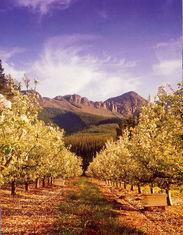
The Capespan Group today reported that its revenue exceeded the R2 billion mark for the first time in 2007, with operating profit jumping 157 per cent to R98.7 million.
Income rose by 19,4 per cent from R1.79bn to R2.14bn (£137m). After releasing the group’s abridged 2007 report, managing director Neil Oosthuizen said that total fruit volumes marketed were four per cent (2.2m cartons) higher in the 12-month period, up to 59m cartons overall.
Oosthuizen said the group’s port operations (FPT) remain under pressure because of the continued move towards containerisation. “Thus FPT’s assets have been impaired by R32.9m with annual group net profit dropping from R88.5m (2006 - restated) to R50.8m,” he said.
While the group’s fruit volume was higher, fruit pallets handled by the port terminals increased by only one per cent. However, the growth in general cargo volumes was 83 per cent year on year - taking the 2007 total to 716,000 tonnes.
Because of declining conventional reefer shipping opportunities, Universal Reefers had to deploy its vessels in other trades. “In the end this proved financially beneficial to the group,” Oosthuizen said.
Meanwhile, Capespan also stepped up its farming operation involvement. Associate company Rapiprop acquired a further seven farming units during 2007, bringing its portfolio to 12 farms. Rapiprop’s recent purchase of the apple and pear farm, Applethwaite, in the Grabouw (Elgin) area was another breakthrough, the group says.
Oosthuizen concluded: “Expanding our global footprint and positioning the group in new markets such as India & China remain priorities. To this effect, we recently concluded a Memorandum of Understanding with Mahindra in India, initiating a pilot project exploring fruit industry business opportunities.”
Prospects for 2008 are good, said the group in its results overview. “Abnormal climatic conditions that occurred early in the season in South African deciduous fruit grwoing regions resulted in crops being late and lower than anticipated export volumes. As a result of the general reeduction in supply the international markets to date have been strong and with the depreciation of the rand have resulted in increased returns to growers and revenue,” said the statement.
“”If these conditions remain the group is well positioned to benefit from it. Our activities from other fruit supplying countries are well set to show continued growth in 2008.”



